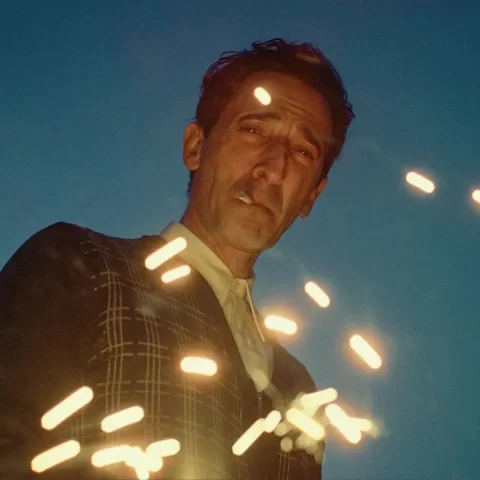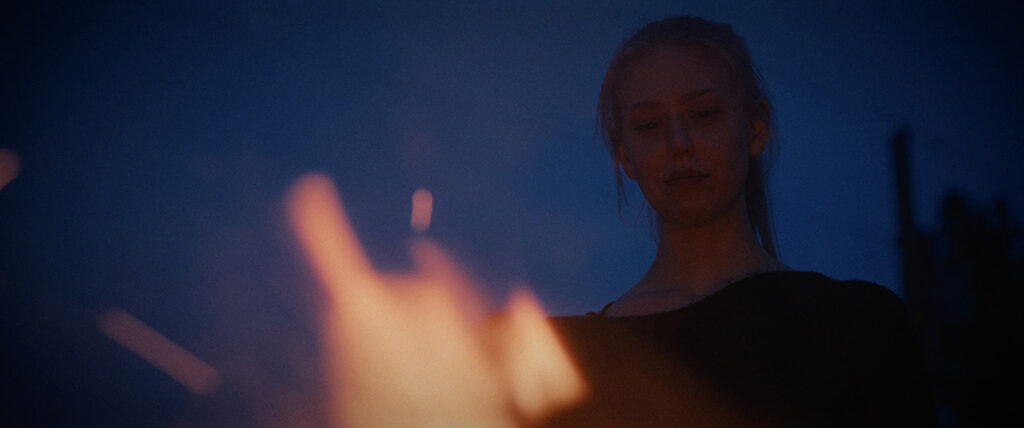
In the new short film They Don’t Leave by director Caz McGovern, a haunting and poignant interplay of generational trauma and addiction unfolds against the isolated, raw beauty of Montana’s sweeping landscapes, where the personal and supernatural eerily merge. At the heart of the film lies a powerful exploration of how the unresolved wounds of the past continue to cling to the present, manifesting in Carly’s struggle with alcoholism and the ghosts of her turbulent childhood. Through Carly’s journey, the film reveals how deeply entrenched trauma echoes through generations, often in ways we fail to see until confronted. For McGovern, storytelling serves as a method of not only confronting these hidden aspects of ourselves but also as a way to illuminate the shadows that linger in us all. In this interview, she reflects on the deeply personal motivations behind the film, the delicate balance between horror and human vulnerability, and the profound ways in which trauma is not only an individual burden but a shared, lingering weight that can ripple through families and across generations.
IC: Your film deals with generational trauma and addiction. Can you share what inspired you to tackle these complex themes, and how personal experience or observation might have influenced the narrative?
Caz: The work that means the most to me is the work that makes me feel seen or heard in some way. My motivation as a writer and filmmaker stems from a desire to shed light on the parts of ourselves that we keep close to our chests that will maybe make someone else feel seen or heard. Generational trauma in particular is a hurdle that so many of us have to wrestle with, and I wanted to give voice to what that can look like. I’ve also always loved the allegorical side to horror and exploring those themes in an entertaining way felt like a fun challenge for me.
IC: Montana’s sweeping landscapes play a significant role in the film. What drew you to this setting, and how did it enhance the story of Carly’s emotional and psychological journey?
Caz: I spent a lot of time in Montana as a kid and still visit whenever I can. I consider it to be one of the most beautiful places in the world, and I’ve always wanted to shoot something there. The themes of the story and the idea of “mountains” that a person has to climb aligned really well with Montana’s landscape, which is already so cinematic. It’s also very vast and rural; this isolated setting seemed to mirror Carly’s internal state when we first meet her in the story.
IC: Carly’s battle with alcoholism and her family’s deep-buried secrets are central to the film. How did you approach balancing these personal struggles with the supernatural elements of the story?
Caz: To me, they’re two sides of the same coin. Feeling haunted by your past or your addictions shares a similar type of overwhelming discomfort. In the film, Carly has repressed her childhood trauma, but it has still shown up in her life through her drinking – then, when she is forced to confront the ghosts that are in the house, she has to confront herself as well – in a way, the personal struggles and the supernatural elements are inextricably connected.
IC: The film’s title, They Don’t Leave, feels ominous and speaks to the idea of lingering trauma. What does the title mean to you, and how does it relate to the core message you hope viewers will take away?
Caz: I sometimes struggle at titling my work, but this one came about really easily. Because the film is ultimately about taking responsibility for yourself, the first step in doing that often comes with the realization that what happened to you as a kid is never going to go away and never going to “leave” you. And so the question becomes, how do you make a meaningful life for yourself, while living with your past and learning to set it down, allowing it to stop defining you? This is the question Carly wrestles with throughout the film, and so the title just naturally seemed to work.
IC: Many horror films rely on jump scares, but They Don’t Leave takes on a more psychological approach. How did you approach creating fear and suspense without relying on typical horror tropes?
Caz: It’s funny, I was really inspired by the film Hereditary when I wrote the first draft back in 2018. I think that film is one of the scariest modern horrors, and it is categorically a horror, no question. Scares were initially a big part of my motivation as a director.
But what we ended up making is much more of a psychological drama with elements of suspense and horror, rather than a really scary horror film. In some ways, this just came about organically on set and in post production with the incredible cast and crew that brought the story to life. I think the discomfort of coming to terms with yourself, which is inherently psychological, became the more interesting part of the story to all of us, and superseded the need to give people a serious fright.
In terms of the moments that we definitely wanted to feel creepy or unnerving, we always approached each beat from Carly’s perception of what was happening in the scene and in doing so, the film became much more a look at psychology and emotion than fully fledged horror.
IC: You’ve mentioned that the film examines how unresolved trauma can “rot at the root.” Can you elaborate on how you portrayed the consequences of ignoring or suppressing trauma, both in Carly’s character and in the horror elements of the film? How do you hope They Don’t Leave contributes to the ongoing conversation around generational trauma and healing?
Caz: Emeline O’Hara, who plays Carly, was the first person to phrase the trauma explored in the film as rotting at the root, and I think it’s very apt. If They Don’t Leave were a feature, I would have loved to spend more time exploring what those consequences look like on a dysfunctional young woman in her late 20’s. Those consequences look like fractured relationships, a destructive lifestyle, and a horrible relationship with yourself. We tried to show some of this with Carly’s drinking habits, a mixed relationship with her mother and step father, and the fact that she’s in her late 20’s and is already going through a divorce with someone who has left her because of her drinking and poor behavior.
If They Don’t Leave adds to the conversation on generational trauma and healing, I hope that its key contribution is that what was done to you as a child was not your fault. However, whether fair or not, it becomes your responsibility to acknowledge what happened and build a life worth living – not just for you, but for those who love you. Ultimately, the message is that what was done to you, need not define you.
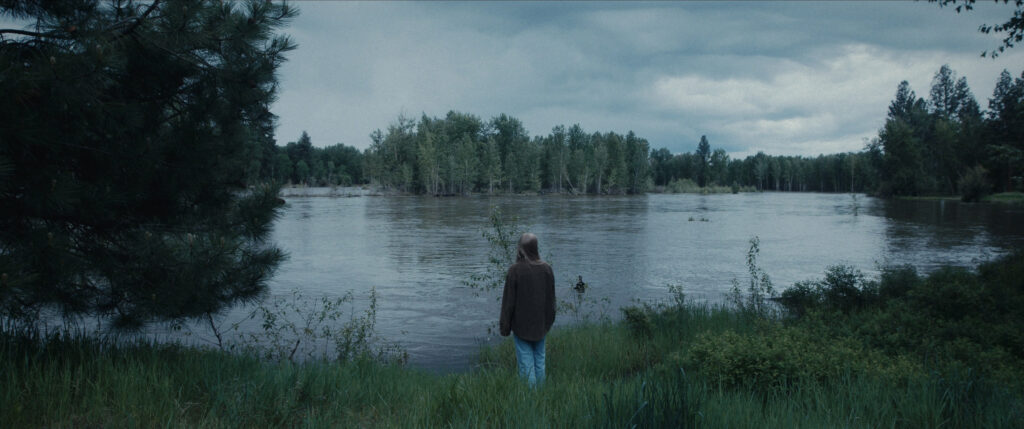
IC: How did you select the cast for They Don’t Leave, particularly the actress who plays Carly? What qualities were you looking for, and how did you help her tap into Carly’s complex emotional landscape?
Caz: I had worked with Emeline O’Hara previously, and though she auditioned, Carly was written with her in mind. Emy has a unique screen presence that is at once subtle and vulnerable, but also dominating and expressive; this makes her perfect for a complicated character. We’ve known each other for ten years, and I love working with her. As women, Carly felt somewhat familiar to both of us. Plus, at this point, we have kind of a shorthand for how we communicate on set and in rehearsals, and so bringing Carly to life felt very organic.
Nancy Bevins, our Montana lead producer, was instrumental in finding all of the Montana cast. I still can’t believe the scope of raw talent that we got to have on set: Mary Riitano who has the most beautiful screen presence and incredible work ethic; Jeff Medley, who’s an absolute rock star; Astrid Maslen, who brought the most vulnerable elegance to Catherine Brooks; Akil Largie, who is a movie star in the making; Moodi Soliman, the easiest person to direct with the best attitude.… I could go on and on and on about the cast we assembled. Working with actors is my favorite part of the process, and I can’t believe how lucky I was to work with such a talented, kind, committed group of people.
IC: You’ve received a number of accolades for the film, including Best Suspense at multiple festivals. How has the festival circuit shaped your perspective on the film, and what has the audience reaction been like?
Every audience that has seen the film has reacted in a slightly different way, which was fun to be a part of. It was my first festival circuit, and I learnt a lot about that part of the business and I made a lot of really valuable connections with people in the industry. The most meaningful moments have been the times that women have approached me after the screening to express how the work resonated with them. There was one instance where two teenage girls approached me, and that was really special. As an artist, you want to make work that creates an impact, and whenever your work resonates with someone- it’s kind of the whole reason we do what we do.
IC: Horror is often a genre used to explore deeper emotional and psychological themes. How did you use the horror elements in They Don’t Leave to reflect the internal struggles Carly faces?
Caz: Sometimes, horror is a vehicle for both frightening and delighting the audience, but at other times, it serves as a means to explore melancholia. They Don’t Leave focuses more on the latter. While moments like Carly seeing two figures in the hallway or waking up to a chaotic room she didn’t mess up are designed to unnerve the audience, we use memory and the objects that Carly finds in the house to delve into the fragility of Carly’s memory and psyche and the core of her forgotten past.
IC: The film’s climax seems to suggest that while trauma isn’t the fault of the individual, responsibility lies in how we handle it. Could you elaborate on this concept and how you developed Carly’s character arc around this idea?
Caz: I think Carly specifically grew out of my own experiences as a 20 something, when I was very lost and chaotic; writing Carly’s arc was really about putting to bed lessons I’d learnt in my life from a time when I had a choice in front of me about who I wanted to become. And so, Carly’s arc came about quite easily when I was writing, because even though They Don’t Leave is entirely fictional, there’s a part of Carly that will always be a part of who I was at one point in my life.
IC: What was the most challenging scene to direct, and why? Can you take us through your creative process in overcoming those challenges?
Caz: This may sound surprising, but principal photography was very drama free. Of course things arose – filmmaking is really just problem solving after all, but apart from some weather issues for exterior shots, I don’t recall intense challenges either in Montana or on our second unit. There were a few scenes that required more sensitivity than others because of the subject matter and a desire for our performers to feel safe and heard. With those scenes, we just took it slow and were cognizant of everyone’s comfort levels.
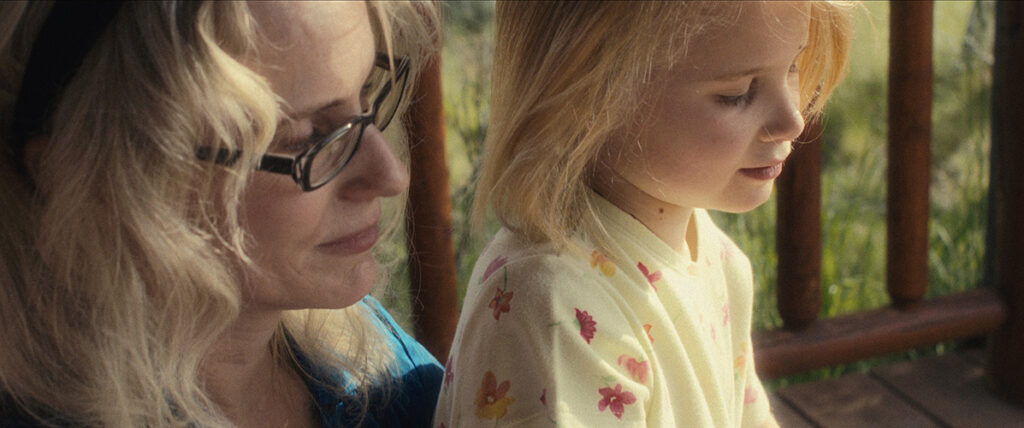
IC: What filmmakers or films influenced your approach to directing They Don’t Leave, especially in terms of blending horror with emotionally charged storytelling?
Caz: Ari Aster’s “Hereditary” was very influential when it came to writing the story. That film scared the pants off me and it definitely made me want to make a horror movie. Jeff Cronenweth’s D.P work on “Gone Girl” – that cool, crisp look definitely came up when Lucas Miller, our brilliant D.P, and I were working on the shot list for the film. Similarly, I remember Alejandro Iñárritu’s choice of color palette on “The Revenant” being one of our references. Thematically, Taylor Hackford’s “Dolores Claiborne” and Robert Wise’s adaptation of “The Haunting” were also influential.
IC: With They Don’t Leave receiving recognition at international festivals, do you feel there is a universal appeal to the film’s themes? How do you see trauma and addiction resonating with different cultures and audiences?
Caz: I certainly hope so! As a filmmaker, you always want your film or your message to ring true with as many people as possible. I would hope that because themes of mental health, addiction, and childhood trauma relate to so many people, that there’s something within that exploration that will hit home with different cultures.
IC: What’s next for you as a filmmaker? Are there any future projects in the works that build on the themes you explored in They Don’t Leave?
Caz: I’m happily ensconced in my writing and my work as a freelance video editor and filmmaker at the moment. I am currently looking to sell my feature length script “The Stray,” and I am in talks with a couple of producers, who are considering it. Tonally, it’s very different to They Don’t Leave; it’s a pulpy, neo noir whodunnit, set in a small town in Arizona. I have two other feature scripts that complete my writing portfolio, and I’ve just started writing another thriller feature called Avalanche with my brother A.D. McKinnon that I’m really excited about. I’m hoping to gain representation, sell The Stray, and then we’ll see about directing a feature length film in a few years. I’m so excited for the future and just want to keep dreaming, while getting better as a storyteller in the process.
Director and Screenwriter Caz McGovern
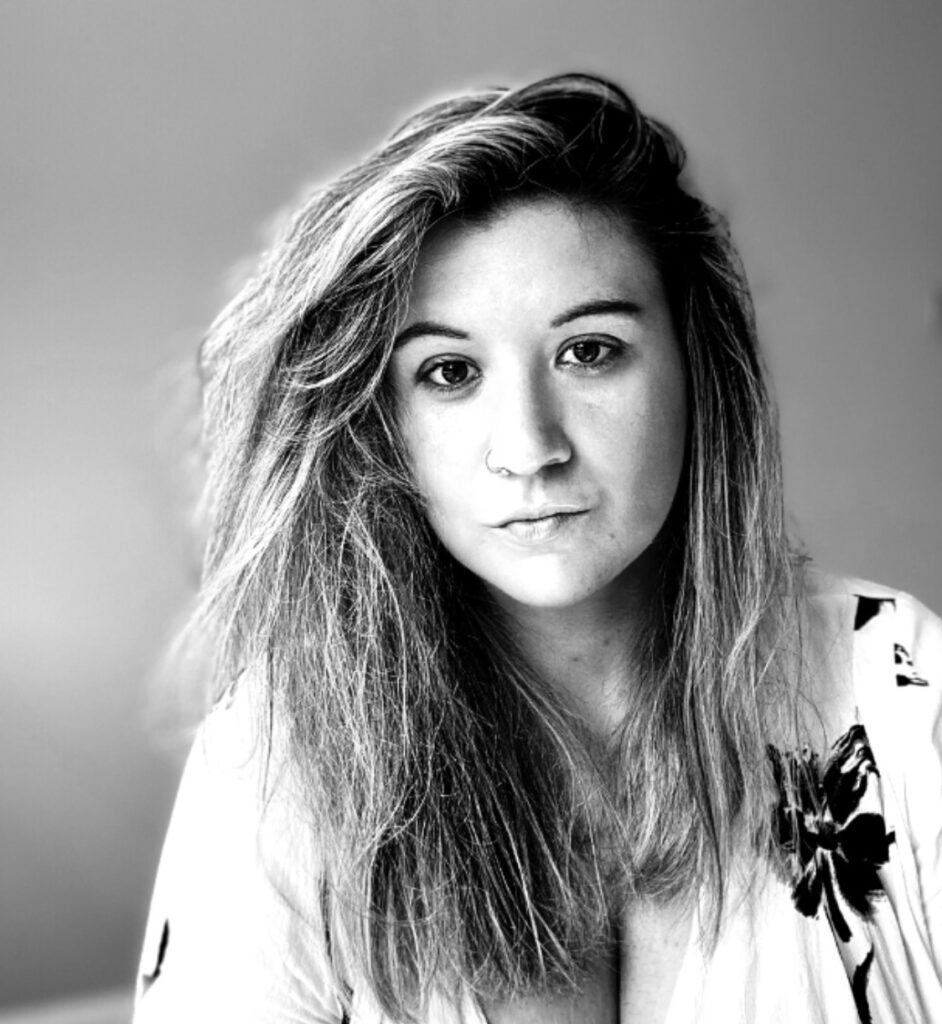
Caz McGovern is an award-winning filmmaker and writer based in London, England, who launched her freelance video editing business, C.M Video Arts, in 2017. Since then, she has managed post-production for various companies across communications, fashion, and publishing, with notable clients including Google, New York Magazine, Becaris Publishing, and the United Nations. In addition to her editing work, Caz has served as a screenwriter, content manager, videographer, and website designer for independent artists and small businesses in both London and New York City. Currently, she is making waves on the film festival circuit with her short film They Don’t Leave, which has screened at 15 festivals and won the Best Suspense Short award at four of them, along with receiving The Big Sky Film Grant. Furthermore, her neo-noir script The Stray is ranked in the top 3% of all feature scripts on Coverfly and is featured on The Blacklist, having also been awarded The Denis Diderot Artist Residency Grant.
Official website of Caz McGovern: https://www.cmvideoarts.com
